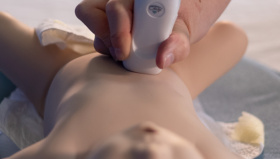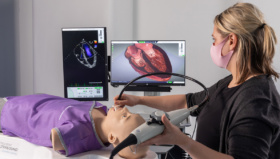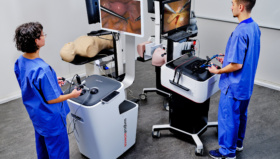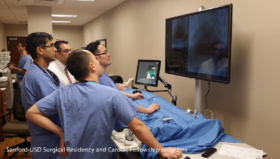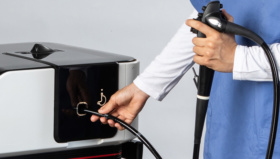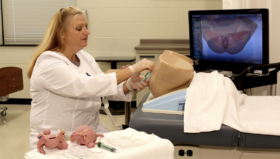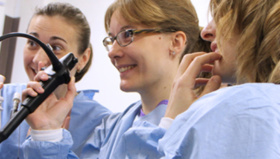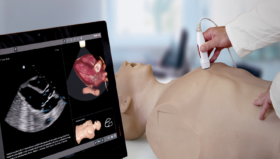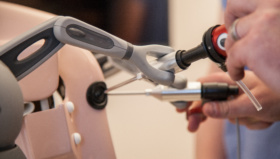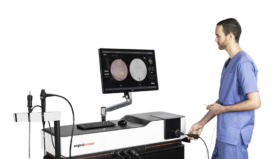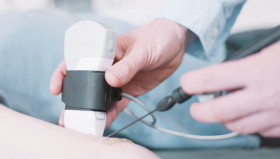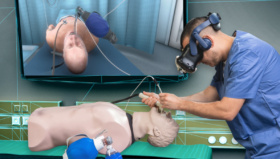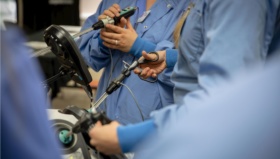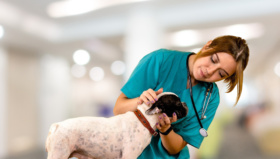The British Society of Echocardiography (BSE) has been at the forefront of ensuring excellence in echocardiography training and accreditation in the UK. With a growing demand for echocardiography and a limited workforce, the need for innovative solutions has never been greater. To address this challenge, BSE has integrated simulation-based learning into its accreditation process, with the HeartWorks simulator playing a crucial role.
Transforming Transoesophageal Echocardiography (TOE) Training
“Clinical training in transoesophageal echocardiography (TOE) is still mainly ‘on the job,’” explained Jane Lynch in 2017, Chair of the BSE Accreditation Committee at the time. Unlike transthoracic echocardiography (TTE), where trainees can practice on volunteers, TOE training is more restrictive as it requires supervision in theatre or catheter labs with sedated or anaesthetised patients. This limitation presents unique challenges for trainees.
HeartWorks has played a pivotal role in overcoming these challenges. “Simulator training is very useful in kickstarting the learning curve so that valuable theatre time can be more effectively used,” Ms. Lynch highlights. The ability to simulate various pathologies and body types allows trainees to develop critical probe-handling skills in a controlled environment before performing the procedure on patients.
Introducing Practical Assessment Days
To enhance the accreditation process, in 2017 BSE introduced Practical Assessment Days, designed to streamline candidate evaluations and provide immediate feedback. Candidates must pass three key stations: logbook review, viva of digital cases, and observed practice with the simulator.
“The HeartWorks simulator has provided the final link in our assessments,” said Ms. Lynch. “We can create a set protocol for the exam to be taken on the simulator, ensuring a standardized benchmark for all candidates to achieve.” The HeartWorks Student Assessment and Review Tool (START) enables assessors to store and review submitted images, improving feedback quality and governance.
Supporting Accreditation Through the Pandemic
During the COVID-19 pandemic, BSE faced a critical challenge: how to continue accreditation while maintaining safety. “We had a workforce crisis before the pandemic,” explained Jo Sopala, CEO of BSE. “We had a lot of trainees coming through and, at the same time, the biggest demand we’ve ever had for echo.”
With traditional TTE practical assessments relying on healthy volunteers, this approach was no longer viable during the pandemic. In response, BSE integrated HeartWorks simulators into the TTE assessment process. “I just can’t tell you how grateful we are, and how grateful our members are, because it meant that we could continue that accreditation process.” says Ms. Sopala.
Between 2020 and 2023, 429 candidates successfully gained accreditation thanks to this adaptation. “I genuinely don’t believe there was a way of us offering the practical assessments without this” Ms. Sopala reflects.
The Future of Echocardiography Training
The success of simulation-based training has reinforced the value of integrating technology into early-stage echocardiography education. “We’ve learned a lot through the pandemic,” says Ms. Sopala. “More use of simulators in the appropriate ways and wider recognition of their value has been a really valuable side effect.”
For accreditation, trainees must collect 250 cases, which can take 12 to 24 months. Early use of simulation can accelerate this learning. “If they’re using the simulator in their early training, they can learn to recognise the pathologies they might come across day by day.”
Looking ahead, the availability of simulation technology for all early trainees could revolutionize echocardiography education. “I think there is a clear role for simulators in the very early part of people’s training,” Ms. Sopala concludes. “Overall, I’m incredibly grateful that this technology exists, and this whole process has shown us just how important it is to have this kind of equipment available to us.”
As part of Surgical Science, HeartWorks continues to provide cutting-edge solutions to enhance echocardiography training, ensuring that future generations of echocardiographers are equipped with the skills they need to provide the highest standards of patient care.
This article is a combination of a case study written by Intelligent Ultrasound in September 2017, and a follow-up article written in May, 2023. Intelligent Ultrasound is now part of Surgical Science.
